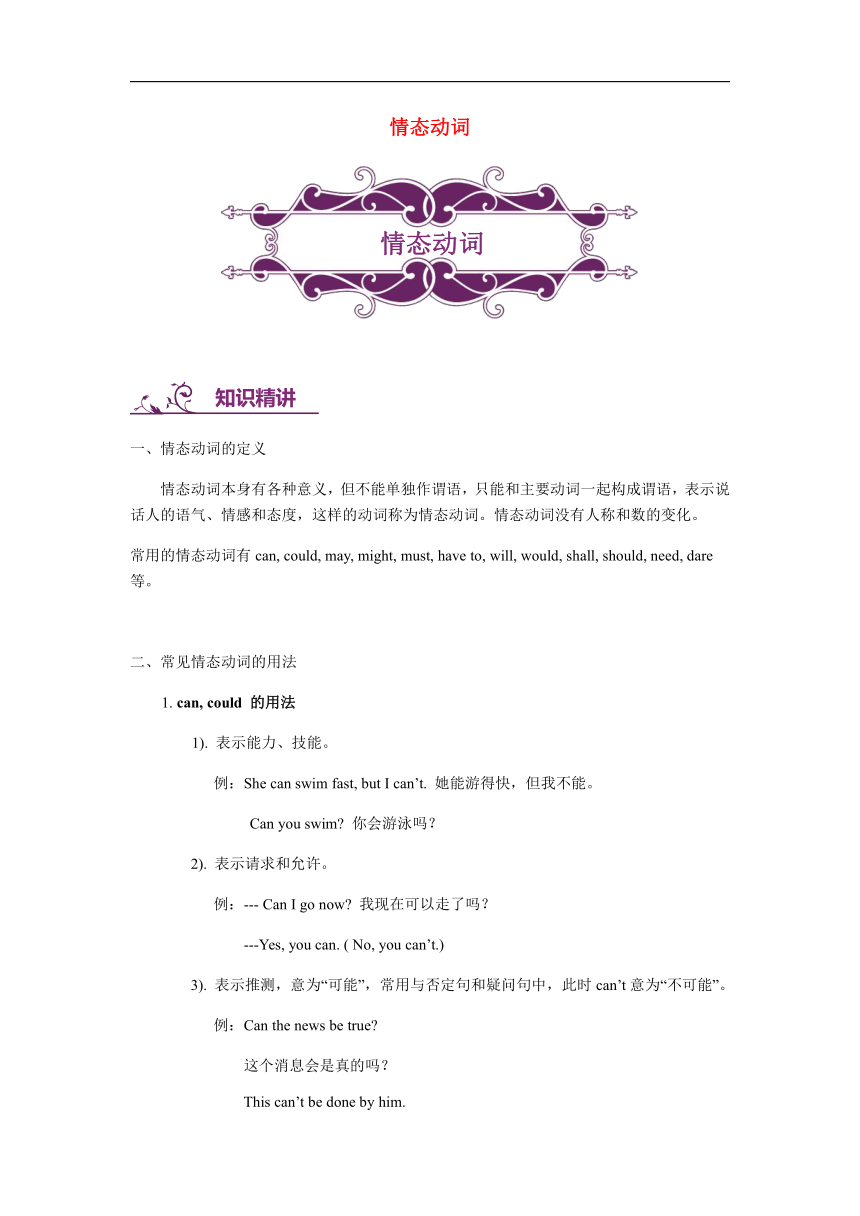
情态动词 一、情态动词的定义 情态动词本身有各种意义,但不能单独作谓语,只能和主要动词一起构成谓语,表示说话人的语气、情感和态度,这样的动词称为情态动词。情态动词没有人称和数的变化。 常用的情态动词有can, could, may, might, must, have to, will, would, shall, should, need, dare等。 二、常见情态动词的用法 1. can, could 的用法 1). 表示能力、技能。 例:She can swim fast, but I can’t. 她能游得快,但我不能。 Can you swim? 你会游泳吗? 2). 表示请求和允许。 例:-- Can I go now? 我现在可以走了吗? --Yes, you can. ( No, you can’t.) 3). 表示推测,意为“可能”,常用与否定句和疑问句中,此时can’t意为“不可能”。 例:Can the news be true? 这个消息会是真的吗? This can’t be done by him. 这个不可能是他干的。 4). 在疑问句中,此时could并不是can的过去式,只是表示委婉的语气。 例:-- Could you do me a favor? 您能帮我个忙吗? -- Yes, I can. ( No, I’m afraid not.) 是的,我能。(不,我恐怕不能。) 5). 表示客观可能性(客观原因形成的能力)。 例:They’ve changed the timetable, so we can go by bus instead. 他们已经改变了时刻表,因此我们可以乘公交车去。 This hall can hold 500 people at least. 这个大厅至少可以容纳500个人。 2. may, might的用法 1). 表请求和允许,might比may语气更委婉,而不是过去式。 例:You may take whatever you like. 你喜欢什么就拿什么。 -- May (Might) I smoke here? 我可以在这里吸烟吗? -- Yes, you can. (No, you can’t/ mustn’t.) 是的,你能。(不,你不能/禁止。) 2). 表示推测可能(不用于疑问句),might不是过去式,它所表示的可能性比may小。 例:He may/ might be busy now. 他可能现在很忙吧。 Your mother may /might not know the truth. 你妈妈可能不知道真相。 3. must, have to的用法 1). 两词都表示“必须、必要”的意思。have to强调客观需要,must是说话人主观的看法。 例:My brother was very ill, so I had to call the doctor in the middle of the night. 我弟弟病得很厉害,因此我不得不半夜里把医生请来。 -- Must we hand in our homework today? 我们必须今天上交作业吗? --Yes, you must. ( No, you don’t have to/ you needn’t.) 是的,你必须。(不,你不必。) 2). have to有人称、数、时态的变化,而must只有一种形式。 例:He had to look after his sister at home yesterday. 昨天他不得不在家照看妹妹。 3). 表示推测、可能性(只用于肯定的陈述句) 例:You’re Tom’s good friend, so you must know what he likes best. 你是汤姆的好朋友,因此你一定知道他最喜欢什么。 Your mother must be waiting for you now. 你的妈妈一定正在等着你。 4. will, would的用法 1). 表示“将、将要、自愿做……”等。 例:People will die without air or water. 人离开水和空气将会死的。 2). will表示请求、建议等,would更委婉。 例:Will/ Would you please pass me the ball, please? 您能递给我这个球吗? Would you like to go with me? 你想和我一起去吗? 5. shall, should的用法 1). shall的用法 (1). 用于第一、第三人称的疑问句中,表示说话人征求对方的意见或请求。 例:Shall Tom go there with me tomorrow? 汤姆明天可以和我一起去吗? Shall I wear the evening dress for your party? 我可以穿晚礼服参加你的晚会吗? (2). 用于第二、第三人称,表示说话人给对方的许诺、命令、警告或威胁。 例:You shall get an answer from me tomorrow. 明天你就会得到我的答 ... ...
~~ 您好,已阅读到文档的结尾了 ~~

